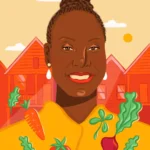Wisdom on Resilience
When asked to reflect on what climate resilience means to them, Climate Resilience contributors responded:
Resilient communities address injustices
“A resilient community is one in which we’ve addressed systemic inequalities. People have access to opportunities. Where there has been historic disinvestment, there’s revitalization but not displacement. Folks have autonomy and self-determination. They have agency over their family’s health, wellbeing, and livelihood.”
Amee Raval![Illustration of Amee Raval]()
“It’s recognizing that people are already very resilient, and some people may already have systems that are so stretched because they’re using all their adaptive capacity, that the real goal is how you alleviate those underlying stresses so that you have more capacity to draw from, whether that’s poverty, racism, crumbling infrastructure, under supported schools, under resourced streets, relationships with law enforcement, etc. All of these things may be overtaxed, under supported, stressful and draining in a whole variety of ways. So resilience isn’t just about mitigating the impacts of disaster. It’s focusing on alleviating these underlying stressors. It’s sort of like a rubber band. It’s really important that we’re not trying to get more out of our rubber bands but instead figure out how to demand less.”
Heather Rosenberg![Illustration of Heather Rosenberg]()
“It’s about learning from the past, actively addressing pressing realities of the present, and doing so with the future in mind.”
Mindy Blank![Illustration of Mindy Blank]()
Resilient communities prevent trauma from occurring
“I think when folks talk about resilience, we talk a lot about the ability to bounce back from trauma. But I think that resilience is also about making sure you’re keeping that trauma from happening again… Resilience is about communities figuring out how they, together, can keep trauma from happening again and figuring out how they can respond to things that are similar.”
Cate Mingoya-LaFortune![Illustration of Cate Mingoya LaFortune]()
“I think there are some beautiful intentions around honoring the resilience of communities, because we want to acknowledge that people are still showing up and doing what needs to be done, given all of the systemic classism and racism and poverty and things that they’ve had to endure, but at the same time, I want to see my community not have to be resilient… I hope that our communities don’t constantly have to be bouncing back from something. I want to know that the work that we’re doing today ensures that there are seven more generations that get to live and enjoy the world and that their lives don’t have to be marked by the ability to live through the trauma. Because there are also so many people who are not bouncing back from the trauma, who are being killed by the police, who are taking their own lives, who are paralyzed by their own mental health issues, that aren’t being protected. I hope the work that we’re doing means less of that.”
Mariela Ventura![Illustration of Mara Ventura]()
Resilient communities are sovereign
“A resilient community to me is one in which they’re doing their own thing. They need for nothing because they’ve created the infrastructure and system to care and uplift the people who live in that community. The brilliance and that care comes from the people. We are our own salvation. A resilient community comes from the recognition that we will save one another and we have each other’s backs and we will create systems of care and safety for ourselves.”
Dominique Thomas![Illustration of Dominique Thomas]()
“It definitely looks like being able to utilize the traditional ecological knowledge that my people have had for centuries and being able to maintain our traditional lifeways, to be able to worship in our own way, to be able to support our families in our own way, and just to be and exist as who we are, who we were created to be.”
Shirell Parfait-Dardar![Illustration of Chief Shirell Parfait-Dardar]()
“A resilient community is thriving in all facets of life, from having the resources that they need, from having the neighborhood that they desire, the walkability that they desire, the safety that they desire, and for it being pervasive across different races, in particular.” - Irfana Jetha Noorani
Irfana Jetha Noorani![Illustration of Irfana Jetha Noorani]()
“A resilient community knows how to take care of themselves and each other despite what’s going on around them. We have our food and medicine growing all around us.”
Margo Robbins![Illustration of Margo Robbins]()
“A resilient community has power and control over the basics and has access to create the other things that we want.”
Cassia Herron![Illustration of Cassia Herron]()
“A resilient community is a community that, first and foremost, has a self-awareness and self-determination that allows them to do the work that’s important to them, to live lives that are healthy where they have access to healthcare, healthy food, education, that their creativity is bursting, that they have the time and space because we’ve done the time and work to reduce the inequality. I guess a well-connected community is a resilient community.”
Eve Mosher![Illustration of Eve Mosher]()
Resilient communities maintain joy
“To me, resilience is about finding and defending that space for joy, compassion, and laughter, despite the fact that we’re fighting a war that is defining our species. Resilience is the capacity to always return to the celebration of what we’re fighting for.”
Ruth Miller![Illustration of Ruth Miller]()
“It looks different and will have different forms depending on the place, but I think it looks like folks being able to make decisions about everyday things that affect their lives, from how they take care of their water to how they deal with conflict and harm to how they explore and celebrate and center pleasure and joy… I feel like it’s got to center an ability to maintain dignity and joy.”
Deseree Fontenot![Illustration of Deseree Fontenot]()
Resilient communities are interdependent
“I think for some people, they think being resilient means keeping the outside community at bay. I don’t believe that. For me, a resilient community is one that can flow inside and outside and feel comfortable. It doesn’t mean you don’t need the outside world. It just means there’s a balance between what you take in and bring out… Things don’t work when it’s out of balance, when communities are more dependent on the outside.”
Janelle St. John![Illustration of Janelle St. John]()
“I think resilience comes down to the strength of the relationships. I don’t just mean one-on-one relationships, though of course helping one another out is crucial. But it’s really building those multi-stakeholder networks.”
Marta Ceroni![Illustration of Marta Ceroni]()
“A resilient community looks like neighbors knowing each other and relying on each other when they need to for support. It also means the means of production are as localized as possible.”
Crystal Huang![Illustration of Crystal Huang]()
“I’ve learned from some of my work in Hawaii that it’s less about resilience and more about relationship to each other and relationship to land and water and environment. When ‘āina is thriving, I think that’s a really strong indicator of a resilient community, for sure.”
Sekita Grant![Illustration of Sekita Grant]()
















